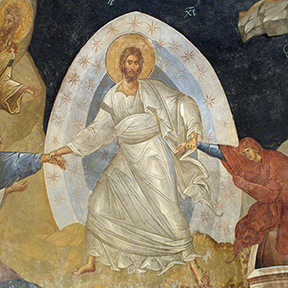
From Our Pastor ~ 3 May 2015
Dear Good People of Saint Mary,
I would like to comment a bit on how beautiful our First Communions have been this year. I realize that we have heard from a few people who are very upset that we have changed the practice from previous years, but the overwhelming response has been one of great happiness, and thanks, for an opportunity to receive Communion in a liturgy that is reverent, connected intimately with the family, and in the context of the community. It is interesting—I also have heard from a great number of parishioners about how this First Communion year is so meaningful to them, it was almost as if it has happened for the first time this year for the parish. To see the
children at Mass is a source of great hope for us.
Well, there is a lot written about how the celebration of the Sacrament should happen on Sunday,and in the context of the community, and I can only say that massive Saturday First Communion liturgies developed out of convenience for the clergy and staff and somehow became “tradition.” It was getting it done. In most parishes where groups were smaller, this was observed always during a Sunday Mass, much in the same way as we are doing it this Easter Season, maybe as many as 16 or 20 children and their families would make the Mass a little more crowded, but the parish survived it. My older brother, Fr. John, has a small parish, average to his diocese,and as is the custom, he will celebrate First Communion with five children this year at a Sunday Mass. You might say that is a perfect world.
I would propose to you that we also know a perfect world here, it just looks different. We have 240 +/- children and seek expressions that are meaningful and still consistent with the solemnity and integrity of communion. In past years we have scheduled three (four last year) Masses with 60 children each. Our church will never be big enough; the fact is, people were pretty mean about it. The Masses were so loud—even as the children came forward to receive First Communion—the level of conversation was so loud that it eclipsed the singing. Each year grew worse. And most everyone counted it as their Sunday obligation, as few children were brought back the next day to be recognized and congratulated by the parish. Everyone knows this is the case, and it couldn’t continue, even if only in the conscience of your pastor. Change was necessary, and as it
was, it was changing for the worse by the year.
When I was first ordained and assigned to All Saints, the largest parish in the diocese 21 years ago, we celebrated First Communions at Sunday Masses. Even then, it was already the norm in most dioceses and I recall them to be days of graciousness and prayerfulness.
But I guess the issue that we don’t like to address is the issue of change. It is natural to hold onto what we have if we find it comfortable. We project our own memories on our children, assuming that they will somehow miss out if it isn’t exactly the same. Sometimes we even keep an old coat in the closet that we really like or spent a lot of money on though we’ve gained weight and can’t wear it anymore without looking ridiculous (I have a few of these coats, actually). “We will lose the weight someday,” we say. But in the meantime we buy a new coat we can wear, so we don’t freeze to death on the really cold days.
I was talking to a priest who is responsible for closing / consolidating some parish churches in Manhattan. Beautiful places far too expensive to maintain; they are crumbling. One church is twice the size of our cathedral in Arlington, and has 80 members who are fighting and fighting to keep it open. Sure, I wish we could move it brick by brick, statute by statue right here—we don’t have anything like it in our diocese. But at
what cost can we afford to do it? At the end of the day, my friend said, it isn’t the change that is the problem. It’s the stained glass window that my grandparents donated (“See—there is their name”) or the baptismal font that our family was baptized in. It isn’t the change at all, it is the loss.There has to be, he said, something that we can see, touch, occupy that is a better solution, but we also must be open to see it when it comes. When we lose someone that we love, if we only see our loss we grieve until we ourselves can’t grieve anymore. But there is a better life to come, one we haven’t known yet.
Ultimately, it’s a good thing that we know what is important, not a what but a Who that we believe in, and that he continues to call, and to lead, if we will follow his call. Jesus went to a lot of trouble knowing that growth, the process of perfecting, requires change. Let us listen to his voice together.
God bless you,
